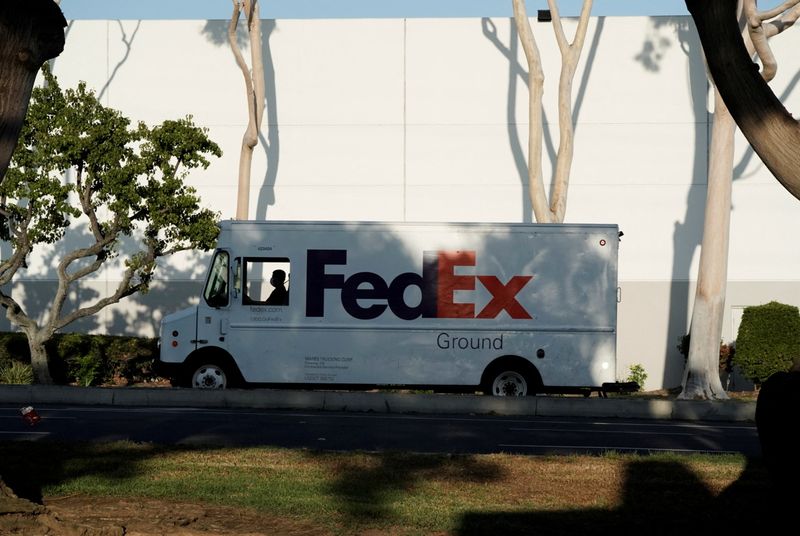By Priyamvada C
(Reuters) - FedEx (NYSE:FDX) may see a profit boost from cost cuts undertaken last year, although its investors will be keen on knowing whether those actions have helped it catch up with rival United Parcel Service (NYSE:UPS) on the margin front.
The global shipping downturn has been a drag on margins for most operators in the sector as the boom during the pandemic deflates, while high inflation and worries of a recession threaten consumer spending.
To avoid a hit to its margins from an industry-wide slowdown, FedEx embarked on a cost-cutting drive in September by shuttering offices, cutting jobs, reducing its fleet of cargo planes and cancelling profit-sapping Sunday deliveries in far-flung areas.
"We believe this (cost cuts) will narrow the margin and valuation disparity to UPS," Atlantic Equities analyst Oliver Holmes said, adding that FedEx's cost-cutting efforts will go a long way in helping the company improve its margins.
FedEx's operating expenses are expected to fall to $20.81 billion for the fourth quarter from $21.13 billion in the prior three-month period when it reports on Tuesday, according to Refinitiv data. UPS reported operating expenses of $20.38 billion in its latest quarter.
On the margin front, however, FedEx has widely lagged UPS, making the Memphis, Tennessee-based company a target of activist investors.
For their latest quarters, FedEx posted a net profit margin of 3.48%, while UPS reported 8.27%. The two companies have different fiscal years.
To further shore up its margins following pressure from an investor, FedEx in April said it would consolidate its separate delivery companies into a single entity - a move some experts see as an opportunity to shrink labor costs.
"It has the potential to further reduce headcount by about 2,000-3,000 jobs in the next two months," said industry consultant Satish Jindel, who helped found the contractor-based company that FedEx bought to compete with UPS on home delivery.
Historically, FedEx's main rival has done a better job of keeping a lid on costs, despite having a more expensive unionized workforce.
Expenses are not the only thing that FedEx is contending with, analysts say. They believe the delivery giant has more exposure to weakness in the "express" air shipment category than UPS, which is more dependent on the so-called ground shipments favored by online retailers and other shippers.
"This dynamic has provided greater organic growth opportunities for UPS as ground market growth has outpaced air," Holmes said.

FedEx is expected to report a per-share profit for the fourth quarter of $4.89 on an adjusted basis, compared with $6.87 a year earlier, as per Refinitiv data. It is estimated to post a 6.9% fall in quarterly revenue to $22.72 billion.
"(FedEx's fiscal) Q4 trended slightly weaker overall for airfreight pricing and consumer demand," said Baird Equity Research analyst Garrett Holland, after lowering FedEx's profit estimate on softer demand through the quarter.